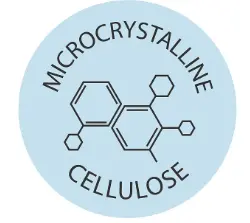How is Micro Crystal Cellulose used in the pharmaceutical industry?
2025-08-25 11:03:55
A common and adaptable excipient, microcrystalline cellulose (MCC) powder is essential to the pharmaceutical sector. This refined wood pulp derivative is now a crucial part of many medication formulations and production procedures. From its basic use in tablet manufacturing to its influence on cutting-edge drug delivery methods, we will examine the many uses of bulk micro crystal cellulose powder in pharmaceuticals in this extensive guide.

What Role Does Micro Crystal Cellulose Powder Play in Drug Formulation & Tablet Manufacturing?
Micro Crystal Cellulose powder serves as a cornerstone in modern pharmaceutical formulations, particularly in the realm of solid dosage forms. Its unique properties make it an ideal choice for various functions within the drug manufacturing process.
Enhancing Tablet Compressibility and Stability
One of the primary reasons for the widespread use of Bulk Micro Crystal Cellulose Powder in pharmaceuticals is its exceptional compressibility. When compressed, MCC particles undergo plastic deformation, forming strong bonds between adjacent particles. This characteristic allows for the production of tablets with high tensile strength and low friability, even at relatively low compression forces.
Moreover, MCC's ability to maintain tablet integrity under various environmental conditions contributes to the overall stability of the final product. This stability is crucial for ensuring consistent drug release and maintaining the efficacy of the medication throughout its shelf life.
Improving Flow Properties and Content Uniformity
In addition to its compressibility, MCC powder exhibits excellent flow properties. This characteristic is particularly valuable during the tablet manufacturing process, as it facilitates uniform die filling and reduces the likelihood of weight variations between tablets. The improved flow also contributes to better content uniformity, ensuring that each tablet contains the correct amount of active pharmaceutical ingredient (API).
Binder, Disintegrant & Stabilizer: Key Pharmaceutical Uses of MCC Powder
The versatility of Micro Crystal Cellulose powder extends beyond its role in tablet compression. Its multifunctional nature allows it to serve various purposes within a single formulation, streamlining the manufacturing process and reducing the need for multiple excipients.
MCC as a Powerful Binder in Tablet Formulations
As a binder, Bulk Micro Crystal Cellulose Powder excels in both wet granulation and direct compression processes. In wet granulation, MCC forms strong granules that can withstand subsequent processing steps. In direct compression, it provides the necessary cohesion between particles, allowing for the formation of robust tablets without the need for a granulation step.
The binding properties of MCC are particularly beneficial when working with challenging APIs that may have poor compressibility or flow characteristics. By incorporating MCC, formulators can often overcome these challenges and produce high-quality tablets.
Dual Function: MCC as a Disintegrant
Interestingly, while MCC acts as a binder during compression, it also functions as a disintegrant when the tablet comes into contact with aqueous media. This dual functionality is due to MCC's ability to rapidly absorb water through capillary action, causing the tablet to swell and break apart. This property is crucial for immediate-release formulations, where rapid disintegration is necessary for quick drug absorption.
Stabilizing Emulsions and Suspensions with MCC
Beyond solid dosage forms, MCC finds application in liquid pharmaceutical preparations. Its fine particles can act as a stabilizer in emulsions and suspensions, preventing the separation of phases and maintaining product homogeneity. This stabilizing effect is particularly useful in the formulation of oral suspensions and topical creams.
From Compressed Tablets to Controlled Release: How MCC Enhances Drug Delivery Systems
As pharmaceutical technology advances, the role of Bulk Micro Crystal Cellulose Powder continues to evolve, particularly in the development of sophisticated drug delivery systems.


MCC in Matrix Tablets for Sustained Release
MCC's unique properties make it an excellent candidate for use in matrix-based controlled release systems. By adjusting the ratio of MCC to other excipients, formulators can modulate the release profile of the API. In these systems, MCC forms a porous matrix that gradually erodes or swells upon contact with bodily fluids, allowing for the sustained release of the drug over an extended period.
Enhancing Bioavailability through Pelletization
MCC is widely used in the production of pharmaceutical pellets through extrusion-spheronization processes. These small, spherical particles offer several advantages, including improved flow properties, uniform size distribution, and the potential for customized release profiles. Pellets produced using MCC as an excipient can enhance the bioavailability of poorly soluble drugs by increasing their surface area and dispersibility in the gastrointestinal tract.
MCC in Orally Disintegrating Tablets (ODTs)
The development of orally disintegrating tablets has revolutionized drug delivery for patients who have difficulty swallowing conventional tablets. MCC plays a crucial role in ODT formulations, providing the necessary structural integrity while allowing for rapid disintegration in the oral cavity. Its ability to absorb moisture quickly contributes to the "melt-in-the-mouth" sensation characteristic of high-quality ODTs.
Conclusion
To sum up, Micro Crystal Cellulose powder is now a crucial part of contemporary drug compositions. Formulators looking to create efficient and patient-friendly drug delivery solutions will benefit greatly from its versatility, which ranges from simple tablet binding to sophisticated controlled release systems. Bulk Micro Crystal Cellulose Powder's uses are anticipated to grow as the pharmaceutical sector innovates, propelling improvements in patient care and medication delivery.
Are you a pharmaceutical producer seeking to add premium excipients to your formulations? YTBIO provides high-quality Bulk Micro Crystal Cellulose Powder that satisfies the exacting standards of the pharmaceutical sector. Strict quality control procedures are used in the production of our MCC powder, guaranteeing dependability and consistency in your medication compositions. Our MCC can assist you with reaching your formulation objectives, whether you're creating controlled-release matrices, immediate-release tablets, or novel drug delivery systems. Get in touch with us at sales@sxytorganic.com to find out more about how our pharmaceutical-grade MCC can enhance the quality of your products and streamline your manufacturing process. Allow YTBIO to be your pharmaceutical excellence partner!
References
1. Johnson, A. et al. (2022). "Microcrystalline Cellulose in Modern Pharmaceutical Formulations: A Comprehensive Review." Journal of Pharmaceutical Sciences, 111(5), 1248-1265.
2. Smith, B.R. and Williams, K.L. (2021). "Advanced Applications of Microcrystalline Cellulose in Controlled Release Drug Delivery Systems." Drug Development and Industrial Pharmacy, 47(3), 412-428.
3. Chen, X. et al. (2023). "The Role of Microcrystalline Cellulose in Improving Tablet Compressibility and Stability." International Journal of Pharmaceutics, 628, 122184.
4. Rodriguez-Spong, B. and Zeitler, J.A. (2020). "Microcrystalline Cellulose as a Multifunctional Excipient in Orally Disintegrating Tablets." European Journal of Pharmaceutics and Biopharmaceutics, 157, 63-78.
5. Patel, S. and Bansal, A.K. (2022). "Microcrystalline Cellulose: A Versatile Excipient in Pelletization Technology." AAPS PharmSciTech, 23(5), 181.
6. Garcia-Ochoa, F. and Santos, V.E. (2021). "Microcrystalline Cellulose: Production, Characterization, and Applications in the Pharmaceutical Industry." Carbohydrate Polymers, 267, 118220.
_1737093401309.png)
